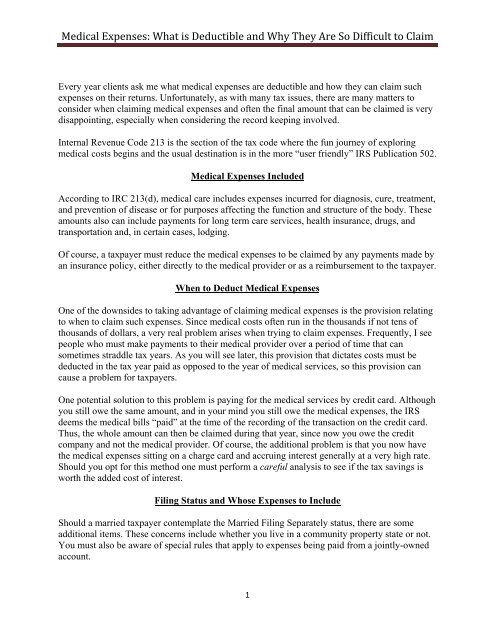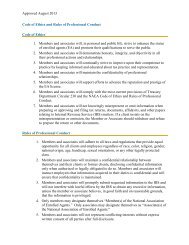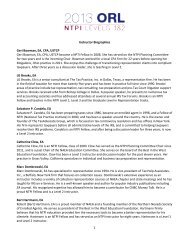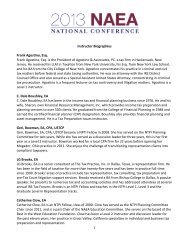Medical Expenses: What is Deductible and Why They Are So ...
Medical Expenses: What is Deductible and Why They Are So ...
Medical Expenses: What is Deductible and Why They Are So ...
You also want an ePaper? Increase the reach of your titles
YUMPU automatically turns print PDFs into web optimized ePapers that Google loves.
<strong>Medical</strong> <strong>Expenses</strong>: <strong>What</strong> <strong>is</strong> <strong>Deductible</strong> <strong>and</strong> <strong>Why</strong> <strong>They</strong> <strong>Are</strong> <strong>So</strong> Difficult to Claim<br />
Every year clients ask me what medical expenses are deductible <strong>and</strong> how they can claim such<br />
expenses on their returns. Unfortunately, as with many tax <strong>is</strong>sues, there are many matters to<br />
consider when claiming medical expenses <strong>and</strong> often the final amount that can be claimed <strong>is</strong> very<br />
d<strong>is</strong>appointing, especially when considering the record keeping involved.<br />
Internal Revenue Code 213 <strong>is</strong> the section of the tax code where the fun journey of exploring<br />
medical costs begins <strong>and</strong> the usual destination <strong>is</strong> in the more “user friendly” IRS Publication 502.<br />
<strong>Medical</strong> <strong>Expenses</strong> Included<br />
According to IRC 213(d), medical care includes expenses incurred for diagnos<strong>is</strong>, cure, treatment,<br />
<strong>and</strong> prevention of d<strong>is</strong>ease or for purposes affecting the function <strong>and</strong> structure of the body. These<br />
amounts also can include payments for long term care services, health insurance, drugs, <strong>and</strong><br />
transportation <strong>and</strong>, in certain cases, lodging.<br />
Of course, a taxpayer must reduce the medical expenses to be claimed by any payments made by<br />
an insurance policy, either directly to the medical provider or as a reimbursement to the taxpayer.<br />
When to Deduct <strong>Medical</strong> <strong>Expenses</strong><br />
One of the downsides to taking advantage of claiming medical expenses <strong>is</strong> the prov<strong>is</strong>ion relating<br />
to when to claim such expenses. Since medical costs often run in the thous<strong>and</strong>s if not tens of<br />
thous<strong>and</strong>s of dollars, a very real problem ar<strong>is</strong>es when trying to claim expenses. Frequently, I see<br />
people who must make payments to their medical provider over a period of time that can<br />
sometimes straddle tax years. As you will see later, th<strong>is</strong> prov<strong>is</strong>ion that dictates costs must be<br />
deducted in the tax year paid as opposed to the year of medical services, so th<strong>is</strong> prov<strong>is</strong>ion can<br />
cause a problem for taxpayers.<br />
One potential solution to th<strong>is</strong> problem <strong>is</strong> paying for the medical services by credit card. Although<br />
you still owe the same amount, <strong>and</strong> in your mind you still owe the medical expenses, the IRS<br />
deems the medical bills “paid” at the time of the recording of the transaction on the credit card.<br />
Thus, the whole amount can then be claimed during that year, since now you owe the credit<br />
company <strong>and</strong> not the medical provider. Of course, the additional problem <strong>is</strong> that you now have<br />
the medical expenses sitting on a charge card <strong>and</strong> accruing interest generally at a very high rate.<br />
Should you opt for th<strong>is</strong> method one must perform a careful analys<strong>is</strong> to see if the tax savings <strong>is</strong><br />
worth the added cost of interest.<br />
Filing Status <strong>and</strong> Whose <strong>Expenses</strong> to Include<br />
Should a married taxpayer contemplate the Married Filing Separately status, there are some<br />
additional items. These concerns include whether you live in a community property state or not.<br />
You must also be aware of special rules that apply to expenses being paid from a jointly-owned<br />
account.<br />
1
<strong>Medical</strong> <strong>Expenses</strong>: <strong>What</strong> <strong>is</strong> <strong>Deductible</strong> <strong>and</strong> <strong>Why</strong> <strong>They</strong> <strong>Are</strong> <strong>So</strong> Difficult to Claim<br />
You may claim expenses you paid for yourself, your spouse (oddly even if you are filing<br />
separate), <strong>and</strong> your dependents.<br />
Included <strong>Medical</strong> Costs—a Closer Look<br />
Although the expenses covered are far too numerous to name here, I will attempt to provide<br />
some examples of items that may be overlooked when calculating your medical expenses.<br />
<br />
<br />
<br />
<br />
<br />
<br />
<br />
<br />
<br />
<br />
<br />
Devices such as crutches, wheel chairs, glasses, dentures, etc.<br />
B<strong>and</strong>ages<br />
Braille books <strong>and</strong> magazines<br />
Fertility enhancement<br />
Pregnancy test kits<br />
Birth control pills<br />
Guide dogs<br />
Health insurance premiums including Medicare Parts B & D <strong>and</strong> certain type of Long<br />
Term Care Insurance policies<br />
Stop smoking programs (except over-the-counter medicines)<br />
Weight loss programs if prescribed by a doctor to treat a specific d<strong>is</strong>ease such as obesity,<br />
hypertension, etc.<br />
Transportation expenses to receive medical care<br />
Another item to be deducted, with careful calculations, <strong>is</strong> permanent capital improvements to a<br />
home to aid you or your dependents. However, if such improvements actually increase the value<br />
of your home you must first subtract any increase in home value from the costs incurred. Only<br />
the amount left, if any, <strong>is</strong> deductible.<br />
<strong>Medical</strong> <strong>Expenses</strong> Not Included<br />
On the contrary side, there are certain medical expenses which can’t be included. I only mention<br />
these here because I am often asked by taxpayers if they can deduct them.<br />
<br />
<br />
<br />
<br />
<br />
<br />
Health club dues. Although you can deduct, as mentioned earlier, for weight loss<br />
programs prescribed for a diagnosed medical condition, these may not include fees for<br />
the health club (i.e. if you pay a fee for specific weight loss program at a club, then that <strong>is</strong><br />
deductible. However, the fees to use the gym are not deductible.)<br />
Funeral costs<br />
Illegal medical procedures<br />
Over-the-counter medicines<br />
Nutritional supplements (unless recommended by a medical practitioner as a treatment<br />
for a specific condition)<br />
Health Savings Accounts (HSA) <strong>and</strong> <strong>Medical</strong> Savings Accounts (MSA). In a roundabout<br />
way you do receive tax benefits with these plans but they are accounted for as<br />
Adjustments to Income on page 1 of the 1040 <strong>and</strong> are not addressed here. See IRS<br />
publication 969 for more details.<br />
2
<strong>Medical</strong> <strong>Expenses</strong>: <strong>What</strong> <strong>is</strong> <strong>Deductible</strong> <strong>and</strong> <strong>Why</strong> <strong>They</strong> <strong>Are</strong> <strong>So</strong> Difficult to Claim<br />
<br />
<br />
<br />
Flexible Savings Accounts (FSA). Keep in mind funds contributed to such accounts are<br />
on a pre-tax bas<strong>is</strong>. Thus, you can’t “double dip” by then claiming expenses withdrawn<br />
from these funds for medical care.<br />
Health Insurance Premiums funded with pre-tax premiums under IRC 125 (i.e., “cafeteria<br />
plans”). Generally speaking, most health insurance policies you buy through your<br />
employer fall in th<strong>is</strong> category <strong>and</strong> are not deductible at tax filing time since you already<br />
received a benefit of funding such policies.<br />
Health Insurance Premiums for the self-employed. These fall under a similar scenario as<br />
HSA <strong>and</strong> MSA. These are generally reported as an Adjustment to Income on page 1 of<br />
the 1040. Please note special rules apply <strong>and</strong> you can’t take an adjustment for premiums<br />
for any month in which you were eligible to participate in an employer provided group<br />
plan. Please see IRS Publication 535 for more details.<br />
The Bottom Line—the Deduction!<br />
You have now gathered all of your documentation <strong>and</strong> you have excluded those items that don’t<br />
qualify, <strong>and</strong> you are ready for that big moment for the tax deduction on Schedule A!<br />
Here <strong>is</strong> where I hate to be negative, but I must be a real<strong>is</strong>t <strong>and</strong> tell you that most of the time after<br />
all of th<strong>is</strong> work you still won’t qualify for th<strong>is</strong> deduction or if so only a minor amount! Here <strong>is</strong><br />
the kicker: You must first complete page 1 of the 1040 <strong>and</strong> compute your Adjusted Gross<br />
Income (AGI) <strong>and</strong> take that amount <strong>and</strong> multiply it by 7.5%. You take th<strong>is</strong> amount <strong>and</strong> subtract<br />
it from your medical expenses <strong>and</strong> only what <strong>is</strong> left <strong>is</strong> what <strong>is</strong> deductible.<br />
For example let’s say you paid out $5,000 in qualified medical expenses. However, your AGI <strong>is</strong><br />
$100,000. You must take 7.5% ($7,500) <strong>and</strong> subtract th<strong>is</strong> first. As you can see you are shy by<br />
$2,500. Thus, no deduction <strong>is</strong> allowed! Yes, I know th<strong>is</strong> hurts. I see th<strong>is</strong> every year <strong>and</strong> time after<br />
time th<strong>is</strong> <strong>is</strong> often the case.<br />
Here <strong>is</strong> another example. Let’s say you still have $5,000 in qualified medical expenses. Except<br />
now your income <strong>is</strong> $50,000. 7.5% of $50,000 <strong>is</strong> $, 3,750. Thus, in th<strong>is</strong> case you can deduct<br />
$1,250 ($5,000-$3,750)! Congratulations!<br />
Well, maybe we shouldn’t celebrate too much yet. Here <strong>is</strong> the next test. You must have enough<br />
other itemizations (i.e., home mortgage interest, real estate taxes, charitable contributions, etc.)<br />
to beat the st<strong>and</strong>ard deduction. Therefore, you may technically have enough medical expenses,<br />
but if you don’t have enough “itemizations” to complete Schedule A to beat the st<strong>and</strong>ard<br />
deduction you are still out of luck!<br />
Unfortunately, after nearly 20 years of preparing returns what I have found <strong>is</strong> that most people<br />
who have high enough medical expenses to qualify are elderly. Generally, elderly people who<br />
own a home have had it paid in full for years <strong>and</strong> the largest item I usually find in itemized<br />
deductions <strong>is</strong> the home mortgage interest. Th<strong>is</strong> problem <strong>is</strong> compounded even more because once<br />
you are 65 you are entitled to an extra st<strong>and</strong>ard deduction of $1,400. Therefore, it has been my<br />
experience that <strong>is</strong> difficult to claim medical expenses. Th<strong>is</strong> problem <strong>is</strong> magnified further by the<br />
fact that to help pay for the Affordable Health Care Act (i.e. the new health insurance law) you<br />
3
<strong>Medical</strong> <strong>Expenses</strong>: <strong>What</strong> <strong>is</strong> <strong>Deductible</strong> <strong>and</strong> <strong>Why</strong> <strong>They</strong> <strong>Are</strong> <strong>So</strong> Difficult to Claim<br />
will have to calculate medical expenses against 10% of your AGI rather than 7.5% starting in<br />
year 2013 (2016 for those over 65)!<br />
However, even if you don’t qualify for the schedule A deduction some states have different<br />
thresholds, <strong>and</strong> although you may not have enough to “itemize” on Schedule A of the federal<br />
form you may find you can use some of these expenses on your state income tax return,<br />
providing you live in a state with an income tax that allows such a deduction.<br />
Th<strong>is</strong> article <strong>is</strong> not meant to be an extensive explanation on IRC 213, <strong>and</strong> has been made to be as<br />
informative as possible without diving into every specific situation. Thus, considering the<br />
“gotcha’s” in th<strong>is</strong> prov<strong>is</strong>ion, I highly encourage you to do further research <strong>and</strong>/or seek<br />
professional guidance before tackling th<strong>is</strong> <strong>is</strong>sue yourself.<br />
4










